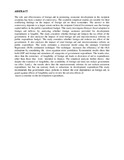| dc.contributor.author | Lagat, Gabriel K | |
| dc.date.accessioned | 2013-05-08T07:54:27Z | |
| dc.date.available | 2013-05-08T07:54:27Z | |
| dc.date.issued | 2004 | |
| dc.identifier.citation | A Research Paper Submitted to Economics Department, University of Nairobi in Partial Fulfillment for the Award ofMasters Degree in Economics Policy and Management. | en |
| dc.identifier.uri | http://erepository.uonbi.ac.ke:8080/xmlui/handle/123456789/20110 | |
| dc.description.abstract | The role and effectiveness of foreign aid in promoting economic development in the recipient countries has been a matter of controversy. The available empirical studies are notable for their conflicting findings on the impact of foreign aid on these economies. The answer to this controversy depends to a larger extent on how the recipient Central Government uses the foreign capital inflow in the public expenditure budget. This study investigates Kenya's fiscal adaption to foreign aid inflows by analyzing whether foreign assitance provided for development expenditures is fungible. The study considers whether foreign aid reduces the tax effort of the government. It also analyzes the impact of total foreign aid and macroeconom.ic reforms on public expenditure budget. The study considers whether foreign aid reduces tax effort of the government. It also analyzes the impact of total foreign aid and microeconomics reform on public expenditure. The study estimates a structural model using the simingly Unrelated Regression (SUR) estimation technique. The technique increases the efficiency of the OLS estimators by considering the cross equation error correlation. Econometric results show that both GDP and foreign aid stimulates all categories of government expenditure. The results also, show that the existernce of fungibility of foreign aid leads to diversion of aid to expenditures other than those that were intended to finance. The empirical analysis further shows that despite the existence of fungibility, the availability of foreign aid does not reduce government tax effor. LastLy the results show that the macroeconomic reforms do not reduces recurrent expenditure, but has on contrary leads to reductions in development expenditure.The study recommends that government enact, policies to reduce the over dependence on foreign aid, to guard against effects of fungibility and to review the adverse effects of
macro-economic on the development expenditure, | en |
| dc.language.iso | en | en |
| dc.title | The impact of foreign aid on public: expenditure and its Fungibility in Kenya (1974-1992) | en |
| dc.type | Thesis | en |
| local.publisher | Department of Arts-Economics | en |

